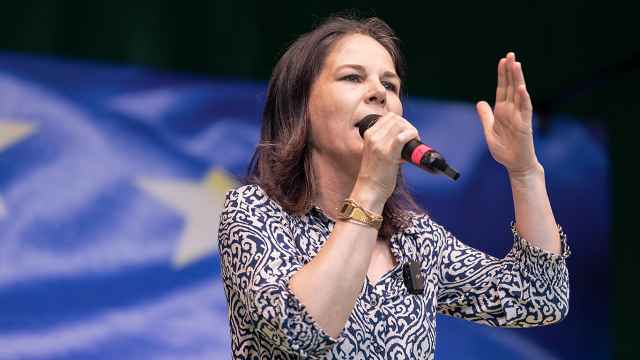President Dmitry Medvedev on Monday backed tougher checks on the income declarations of government officials, called for stronger anti-corruption measures in state procurements, and introduced new rules for implementing his orders.
Medvedev's whirlwind of activity promises to bear fruit. Kremlin officials said the percentage of his orders being implemented is close to the highs seen under Josef Stalin and that Medvedev is far ahead of his tough-talking predecessor, Vladimir Putin, in his early years in power.
Medvedev ordered Prosecutor General Yury Chaika to draft legislation to assist prosecutors in their checks of officials' income declarations.
"Prepare the legal amendments. I am ready to support them in order to make the checks more clear and effective," Medvedev said in response to a complaint from Chaika about weak regulations on income checks during a video conference call dedicated to how officials fulfill presidential orders.
Making officials file income declarations was a hallmark of Medvedev's much-touted efforts to fight corruption. But the campaign has been heavily criticized as toothless and, thus, a publicity stunt.
Medvedev told Chaika to make information about income checks public. "The power of this effort is in [the information]. If we are going to keep it in cold storage, it would be better not to start any checks at all," he said.
Chaika, whose agency was tasked by Medvedev to check declarations, said the list of officials and the information about their incomes is limited, while government agencies and regional administrations are free to decide their own lists of officials who should file declarations. As a result, Chaika said, "positions prone to possible corruption" don't make it into the lists. He named the Transportation Ministry, the Federal Agency for Financial Monitoring and the Federal Consumer Protection Service as agencies whose staff did not file income declarations.
Chaika also said prosecutors don't have legal tools to investigate whether officials keep assets abroad.
More than 41,000 violations were detected on 2009 income declarations, and 6,000 officials have been reprimanded, he said.
But, he said, these figures are the tip of the iceberg. He said more than 9,000 Interior Ministry officials have failed to report their incomes and those of close relatives. Of the declarations that were filed, 200 violations were found in the Interior Ministry's headquarters alone, while another 300 violations were found in the Defense Ministry, he said. Many violations involve hiding information about owning shares in businesses and participating in the companies' management, Chaika said, adding that several criminal cases have been opened.
So far, the only widely reported case of a senior official punished for falsifying his income declaration dates back to September, when Medvedev fired a military general, Viktor Gaidukov, for failing to report about several bank accounts.
Anti-corruption campaigners have pushed for Medvedev to crack down on officials who fail to file declarations or offer thin declarations that seem to clash with their extravagant lifestyles. Notably, the Yabloko opposition party appealed to Medvedev last year to check the income declarations of several lawmakers. The request went nowhere.
Yelena Panfilova, head of the Russian office of Transparency International, a global anti-corruption watchdog, said existing legislation is sufficient to fight corruption if followed thoroughly. The biggest challenge, she said, is the lack of a qualified task force to deal with the problem.
"Checking the income declarations of officials is not a regular task for professionals working in the prosecutor's office or, let's say, in the tax service," Panfilova said by telephone.
Instead of tweaking the law, Medvedev should order the creation of an agency that unites and trains financial investigators, she said.
Moving to online tenders for state procurement orders, another corruption issue that has increasingly come under public scrutiny, Medvedev demanded on Monday that government officials report to him about what has been done to streamline the orders.
"Part of the money is effectively getting stolen, and this must not be tolerated," Medvedev said, adding that officials should explain the initial prices they set for tenders and that the tenders themselves should be better monitored.
Bloggers often catch controversial and apparently corrupt tenders on web sites executing state procurements, such as government agencies ordering goods or services at prices significantly above market value or formulating orders in such a way that only one provider could match them.
Medvedev said last fall that the government loses $30 billion a year to corruption in the tenders and ordered legislation to prevent the graft. Two rival bills — one prepared by the Federal Anti-Monopoly Service and the other by the Higher School of Economics — are being considered by the government.
Federal Anti-Monopoly Service head Igor Artemyev said Monday that his agency has developed an online registry mechanism that allows real-time monitoring of every tender and provides access to the tender database for 10 years. Medvedev praised the effort Monday.
The president also signed a decree Monday setting rules for how presidential orders and decrees should be implemented and monitored by his administration. From June 1, presidential orders will become more regulated, with rules requiring officials to explain why they failed to meet a deadline and how to ask to extend the deadline.
Medvedev complained at a meeting last year that government officials were ignoring his orders and deadlines.
Konstantin Chuichenko, head of the presidential administration's oversight watchdog, said Monday that officials are increasingly obeying Medvedev. He said only 63 percent of Medvedev's orders were implemented in 2009, but the figure jumped to 90 percent last year. The number of fulfilled orders stood at 1,102 in 2009 and 1,801 in 2010.
Curiously enough, the oversight watchdog reported in 2002 that 81 percent of then-President Putin's orders had been fulfilled, comparing them with 54 percent in 1999 when Boris Yeltsin kept the government in constant turmoil amid his search for a loyal successor.
All-time highs for fulfilling Kremlin orders were set under leaders such as Stalin. According to Andrei Neshchadin, who worked in the Communist Party's Central Committee, less than 5 percent of all orders went unfulfilled before Mikhail Gorbachev came to power.
A Message from The Moscow Times:
Dear readers,
We are facing unprecedented challenges. Russia's Prosecutor General's Office has designated The Moscow Times as an "undesirable" organization, criminalizing our work and putting our staff at risk of prosecution. This follows our earlier unjust labeling as a "foreign agent."
These actions are direct attempts to silence independent journalism in Russia. The authorities claim our work "discredits the decisions of the Russian leadership." We see things differently: we strive to provide accurate, unbiased reporting on Russia.
We, the journalists of The Moscow Times, refuse to be silenced. But to continue our work, we need your help.
Your support, no matter how small, makes a world of difference. If you can, please support us monthly starting from just $2. It's quick to set up, and every contribution makes a significant impact.
By supporting The Moscow Times, you're defending open, independent journalism in the face of repression. Thank you for standing with us.
Remind me later.






